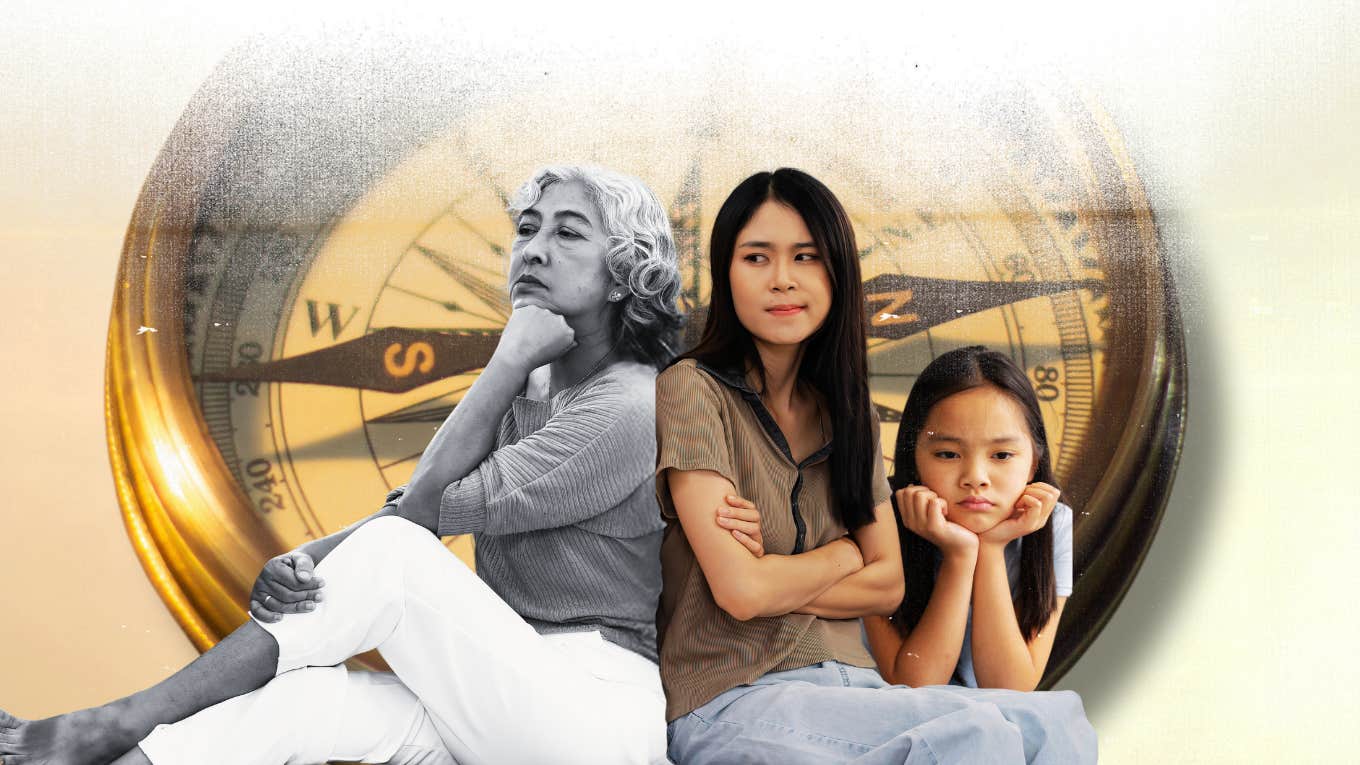Maternal Abandonment: I Became A Homemaker, Cook, And Mediator At 16
The mother-daughter relationship is incredibly impactful.
 WICHAYADA SUWANNACHUN's Images, Prostock-studio, Jaiju Jacob | Canva
WICHAYADA SUWANNACHUN's Images, Prostock-studio, Jaiju Jacob | Canva My Mother Next Door is a tale I hadn't planned to share, but it's the book I was destined to write. It serves as a reminder that each of us has a story, rooted in our relationship with our mother, filled with messy, painful, unexpected, beautiful, and comical moments.
Ah, the tangled web of mother-daughter relationships — our foundational relationship, where love and frustration often dance a delicate tango. For me, this dance began a week after my sixteenth birthday when my 61-year-old mother, over tea and biscuits, dropped a bombshell: she was leaving, off to reclaim her independence after giving my father and me sixteen tumultuous years of her life.
In her endearing words, I was “big and ugly enough to take care of myself”, she was done. She didn’t go far, however; she moved directly next door to start a whole new life with three hot college guys, leaving me in the dust to break the news to my 77-year-old father and grapple with the fallout of her unapologetic abandonment.
And so, the story unfolds in revolutionary 1970s London, when London was blowing up all over the place, literally, amid societal upheavals, platform shows, disco fever, and my teenage challenges. It was an era when women were making headlines, and not just because they were burning their bras! The feminist movement was in full swing, which mirrored my mother's quest for personal liberation, shaping my belief that anything is possible and giving me the freedom to make my own choices and live my life by my own definition — even though it certainly wasn’t my choice to be an ill-equipped homemaker, cook, and mediator at sixteen. Wasn’t I the one who was meant to leave home?
I firmly believe I chose to be born to my mother so that she could toughen me up for the world, while still enlightening me in ways that many would find contradictory. Mother was a multitude of characters rolled into one old soul. She was a larger-than-life, 4’11” Irish pistol who could cut you in two with a lash of her tongue, and in her next breath, gift you with her infinite wisdom and charm you with her hospitality, giving me the perfect foundation for any boardroom.
Despite the unconventional circumstances, my upbringing emphasized independence, resilience, and facing challenges head-on. My mother's departure was a pivotal moment that taught me to endure and most recently fueled my courage to write and publish my story.
Amidst the chaos and confusion of those early years and even while writing the book, I have chosen not to dwell in the past, just as my mother never did. Instead, I embarked on a journey of understanding and forgiveness sprinkled with a heavy dose of humor to expand my understanding of her bold move and humanity. What I came to understand through the laughter and the tears is that my mother's actions were shaped by her own life experiences and limitations, not mine.
Here are 5 steps to help us navigate the complexity of the mother-daughter relationship — or any relationship:
1. Deep reflection
Understanding our mothers' past can illuminate the motivations behind their actions. By delving into their history, we can gain insight into why they behaved the way they did, refreshing our perspective and fostering empathy.
2. Humor
Humor helped me survive those tumultuous teenage years, softening the hard edges of most situations. My mother's larger-than-life personality, infused with humor and wisdom, left an indelible mark on me. Her ability to find humor in adversity and embrace life's possibilities inspired me to balance laughter with tears.
Humor serves as a lens to navigate life's complexities, allowing us to accept our flaws while celebrating our humanity. So, here's to you, Mum, for teaching me that sometimes, the best way to weather life's storms is with a smile on your face and a joke up your sleeve.
3. Accept limitations
However hard it may be, recognizing and accepting our mothers' limitations can be liberating. Whether it's their inability to express affection or fulfill promises, understanding their constraints allows us to manage our expectations and foster a more realistic relationship.
6. Stop judging
Despite their flaws, our mothers deserve to be judged by the sum of their actions, not just their mistakes. Acknowledging their efforts and the love they've given us can help us let go of resentment and embrace compassion.
 fizkes / Shutterstock
fizkes / Shutterstock
7. Forgiveness
Forgiveness is vital to our well-being. As written in the epilogue of my book, forgiveness is the courage to accept that there are things (people) out of our control. Forgiveness frees and allows us to move forward without bitterness. Forgiveness is a new dawn, enabling us to feel somewhat whole and in control of our destiny in this crazy world.
Ultimately, our mothers are imperfect beings, just like the rest of us. But amidst the pain and chaos my mother caused, my upbringing taught me invaluable lessons: reflection, acceptance, resilience, humor, and the courage to carve out my path. By viewing our mothers' stories with compassion and understanding, we can break free from the cycle of complexity and confusion and embrace the true essence of our humanity: love, compassion, forgiveness, and the capacity for continued growth.
Diane Danvers Simmons is the author of My Mother Next Door and host of Mothers & Daughters Unfiltered podcast and workshops.

